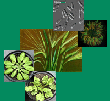| van Veen, H; Vashisht, D; Akman, M; Girke, T; Mustroph, A; Reinen, E; Hartman, S; Kooiker, M; van Tienderen, PH; Schranz, ME; Bailey-Serres, J; Voesenek, LACJ; Sasidharan, R: Transcriptomes of eight Arabidopsis thaliana accessions reveal core conserved, genotype- and organ-specific responses to flooding stress, Plant Physiology (2016), doi:10.1104/pp.16.00472 | |
| Abstract: Climate change has increased the frequency and severity of flooding events, with significant negative impact on agricultural productivity. These events often submerge plant aerial organs and roots, limiting growth and survival due to a severe reduction in light reactions and gas exchange necessary for photosynthesis and respiration, respectively. To distinguish molecular responses to the compound stress imposed by submergence, we investigated transcriptomic adjustments to darkness in air and under submerged conditions using eight Arabidopsis (Arabidopsis thaliana) accessions differing significantly in sensitivity to submergence. Evaluation of root and rosette transcriptomes revealed an early transcriptional and posttranscriptional response signature that was conserved primarily across genotypes, although flooding susceptibility-associated and genotype-specific responses also were uncovered. Posttranscriptional regulation encompassed darkness- and submergence-induced alternative splicing of transcripts from pathways involved in the alternative mobilization of energy reserves. The organ-specific transcriptome adjustments reflected the distinct physiological status of roots and shoots. Root-specific transcriptome changes included marked up-regulation of chloroplast-encoded photosynthesis and redox-related genes, whereas those of the rosette were related to the regulation of development and growth processes. We identified a novel set of tolerance genes, recognized mainly by quantitative differences. These included a transcriptome signature of more pronounced gluconeogenesis in tolerant accessions, a response that included stress-induced alternative splicing. This study provides organ-specific molecular resolution of genetic variation in submergence responses involving interactions between darkness and low-oxygen constraints of flooding stress and demonstrates that early transcriptome plasticity, including alternative splicing, is associated with the ability to cope with a compound environmental stress. |

